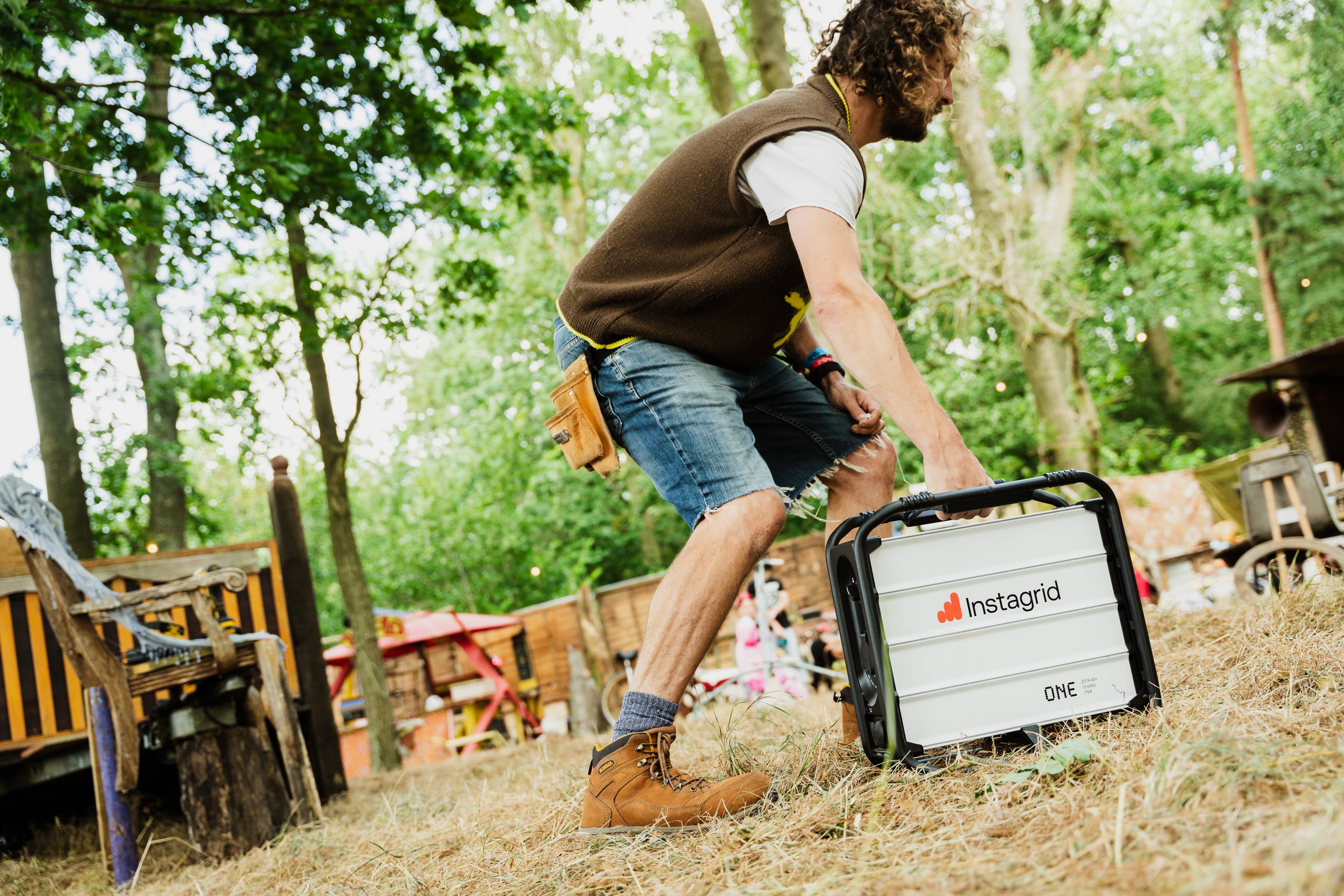Shambala Festival is a four-day independent music and arts festival held annually in Northamptonshire, England, during the August Bank Holiday weekend. It is renowned for its diverse entertainment including music, cabaret, workshops, comedy, talks, and interactive performances—as well as its strong commitment to sustainability and community engagement.
Sustainability is at the heart of Shambala Festival. Ahead of their 2024 event, organisers reached out to Instagrid’s UK team to trial five Instagrid ONE battery-based portable power packs. These units were used to support everything from the build phase to demobilisation and all that came in between.
The team wanted to:
Increase the availability and accessibility of power across the festival site.
Decrease the duration generators are turned on for, and therefore reduce the consumption of fuels (HVO, Fossil or otherwise) and subsequent CO2 emissions.
Improve the responsiveness of requests for power in remote areas of the festival site.
Eliminate the need for generators in some locations.
Applications
Early power requirements - box office. The main crew box office, which operated for a duration of 3 weeks accredited crew members as they entered the festival site. The team primarily use laptops, scanners and Wi-Fi for a period of up to 12 hours per day. To avoid turning on a generator specifically to power the box office cabin, 1 x Instagrid unit was deployed, with a 16A to 13A adapter, and 4-way extension cable. This allowed the users to charge various devices and utilise the internet for their work. Due to the low draw on the battery unit, it typically lasted 2 to 3 days before being swapped out for a fully charged unit. This saved approximately 370L of fuel over the duration (2.2L / hour, 12 hours per day for 14 days - based on a 25% load on a 20kVA generator).
Build power - rimski’s yard. A small venue in a remote location at Shambala festival required power and charging facilities for tools to build set, and decor. Rather than run an extensive amount of cable from the nearest generator (200m+), 1 x Instagrid battery was used on rotation to charge their power tools. The unit was rotated every other day for a period of 1 week to continually facilitate power needs.
Emergency power - water mains repair. During the break period of the event, it was necessary to repair a water main that had been severed during the show. At this point the main generator sets, distribution and cabling had been removed from the site. To access the pipe and stop the surround trench from back filling with water, power was required for a sump pump to keep the work area clean. 2 x Instagrid batteries were deployed, for 2 x sump pumps. 1 was continuously run whilst parts were being retrieved, and a second installed whilst works carried out to keep up with the backflow of water from the pipework (1000L+).
Emergency power - sanitation pump. A remote toilet block in a public location required additional pumps to support the storage of liquid waste. Rather than trench a power cable through the public domain during the live show, 1 x battery pack was deployed. The nature of the pump being on-demand with a float, meant that the load on the battery was relatively small, allowing it function across the 4 days it was in situ. Not only did this relieve pressure on the power team, but also on the sanitation team. It resulted in avoiding repeat call-outs to the same block to remove waste when local storage solutions were available.
Emergency power - electric buggy charging. In line with Shambala’s sustainability goals, electric buggies have been increasingly adopted. Despite charging policies, some users occasionally drained their batteries in remote areas. With Instagrid units on hand, the plant management team was able to provide temporary recharging, giving buggies just enough power to return to central charging points. This was particularly crucial during live show periods when towing vehicles through crowds was unsafe or impractical.
Temporary remote power - recycling centres. Located within campsites, recycling centres operated briefly (Sunday and Monday), allowing guests to exchange waste for their sustainability bond or a gift bag. These remote, temporary setups needed reliable power for laptops, scanners, and Wi-Fi.
Three Instagrid units, with adapters, were deployed. This eliminated the need for small generators at each location, saving roughly 50 litres of fuel per site and avoiding the deployment of three generators, plus associated labour.
Late power - waste crew catering. The waste management crew is among the last to leave the festival. To support their catering unit during the final break period—after the local generator and distribution had been removed—one Instagrid unit was deployed to power a fridge and kitchen equipment. Due to the higher power draw, the unit was swapped out daily.
This saved an estimated 420 litres of fuel over five days (based on a 30kVA generator running at 50% load, 24 hours/day).
Charging on site:
Battery packs were charged from a mains grid connection on a green tariff, provided by 100% renewable energy.
Savings and results:
The deployment of Instagrid units had a significant positive impact across numerous scenarios at the festival. Their simple plug-and-play functionality and visible battery indicators empowered users to proactively request battery swaps, keeping downtime in remote areas to a minimum.
Instagrid helped alleviate pressure on various teams by covering unplanned or emergency power requirements without the logistical challenges of installing temporary infrastructure.
Planned use in remote locations resulted in fuel savings of around 1,000 litres, with additional savings in generator deployment, transport, and labour. These contributed to notable financial, operational, and environmental benefits.
Want to experience Instagrid on your next event? Get in touch
Request a call
We’re here to help. Whether you have a question, want to talk through your own applications or book a demo, our team is ready to call you back. Simply fill out the form and we’ll be in touch soon.
